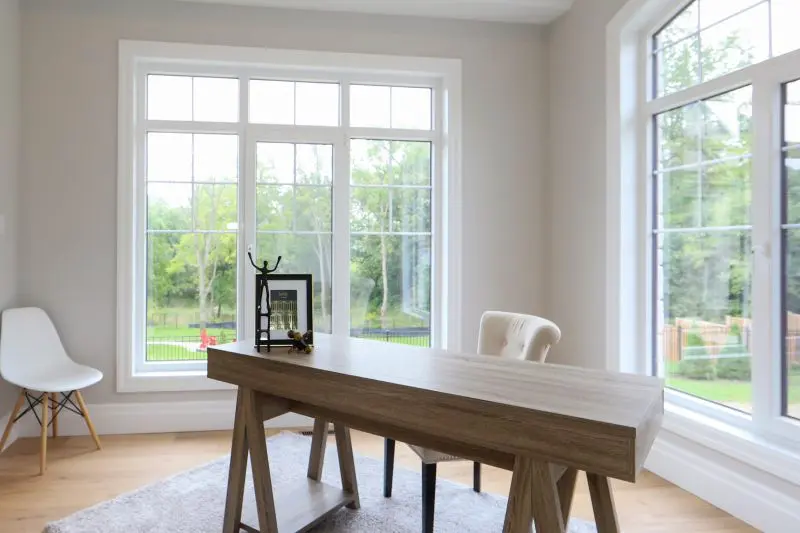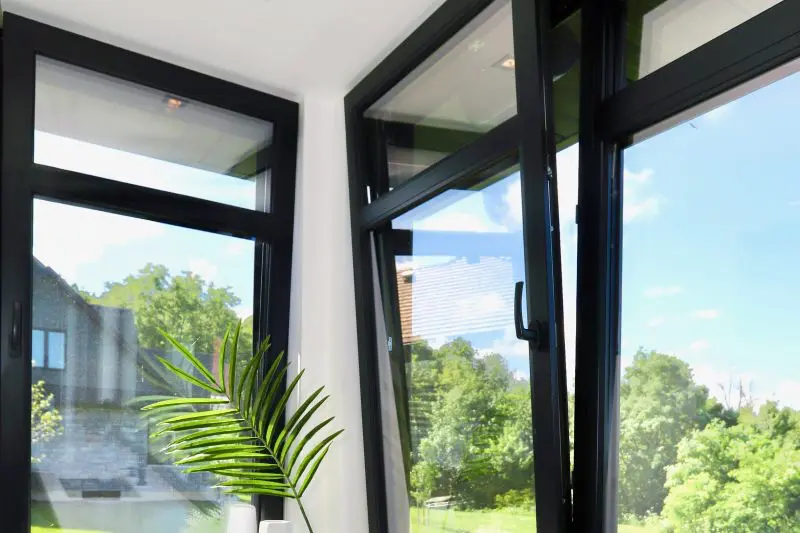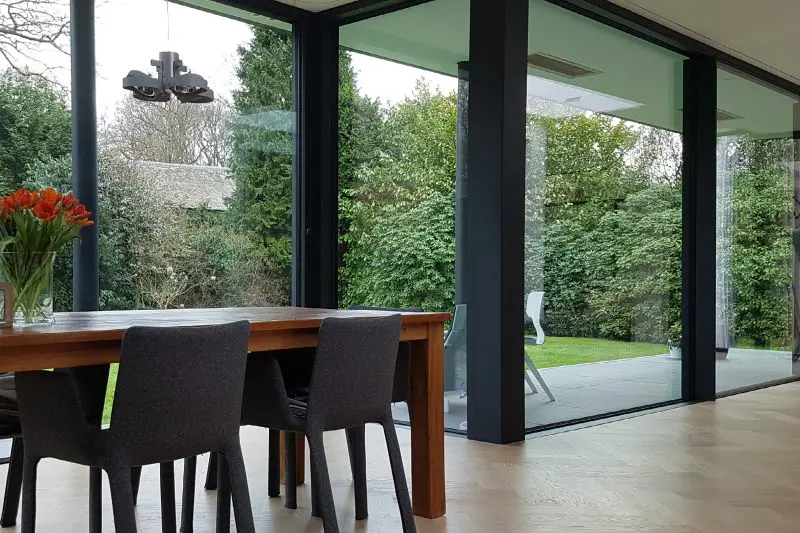When it comes to selecting new windows for your home, homeowners are often unsure of how to choose between PVC and aluminium windows.
The truth is that both have their strengths and benefits, making it a tricky task to choose the one that suits your property needs best.
To help you decide, we’ve delved into this topic in more detail so that you can make an informed choice based on energy efficiency, maintenance, aesthetics and more.
What’s the difference between PVC and aluminium windows?
When deciding between PVC and aluminium windows, it’s essential to understand the key differences in their construction, benefits, and practical considerations. Both materials are superior choices compared to alternatives like AluClad or timber, yet each has unique advantages to offer.
- PVC (polyvinyl chloride) is a popular material for window frames thanks to its affordability, energy efficiency, and minimal maintenance requirements. You may also encounter the term ‘uPVC’, which stands for unplasticised polyvinyl chloride. This version offers similar benefits but without the use of synthetic plasticisers. For homeowners seeking a cost-effective solution with excellent insulation and a traditional aesthetic, PVC windows are a solid choice.
- Aluminium windows, by contrast, are prized for their strength, durability, and sleek, modern appearance. While they may involve a higher initial investment than PVC, their robust construction offers excellent long-term value and enhanced security.
Both materials are thermally efficient, making them smart choices for energy-conscious homeowners. The best option for you will depend on your specific needs: PVC excels in providing a budget-friendly, well-insulated solution, while aluminium offers unmatched durability and a contemporary look.
Ultimately, both options present a solid, reliable choice far superior to less effective alternatives. Seeking advice from the experts will help you to make your decision with confidence and peace of mind, but in the meantime, let’s take a look at the most important overall factors to consider.

PVC and aluminium windows: Weighing the options up
When choosing new windows for your home, it is wise to look into either PVC or aluminium, as opposed to AluClad, given their superior status. With both of these styles in mind, there are several vital factors to consider before settling on your perfect pick.
Which type of window is most durable?
Aluminium comes out on top in the durability stakes, particularly when compared to timer or AluClad alternatives. Given its inherent strength, it offers superior longevity – sometimes lasting upwards of 45 years. This quality also enables them to withstand the harsh weather conditions we now regularly experience in Ireland. They are also resistant to warping and require minimal maintenance.
PVC windows are also durable, with an average lifespan of up to 30 years. They are generally low maintenance, but issues may need to be addressed and repaired from time to time.
Which window type is more affordable?
Budget is understandably a key concern for homeowners when selecting new windows. In terms of price, PVC generally wins this round as the cost-effective choice.
Due to the higher cost of materials and the manufacturing process, aluminium windows tend to be the more expensive option.
However, the most important action to take when considering cost is to weigh up the initial investment required for both window types against their individual long-term benefits.
Which is more energy efficient?
In a quest to be more environmentally conscious and keep up with rising energy costs, homeowners in Ireland are becoming increasingly aware of making sustainable and budget-friendly choices.
In 2023 alone, 47,900 homes received energy upgrades supported through Government-funded SEAI grant schemes. Window replacements are often a key component of such retrofits, but making the right selection is key to boosting energy efficiency.
So, what exactly is the wise choice to make from this point of view?
Turns out, it’s a pretty level playing field. Although PVC windows are well known for their ability to reduce heat loss through excellent insulation, aluminium windows also have their advantages. Despite historically being less insulative, they have become far more efficient in this area in recent years thanks to their modern design, which incorporates thermal breaks. These sections of plastic significantly enhance the energy efficiency of the windows, making them as powerful a choice as PVC.
From a sustainability standpoint, aluminium is fully recyclable, while PVC is also very easily recycled – and often put straight back into production.
Which has more aesthetic appeal?
While all of the above practicalities are vital to consider when replacing your windows, it’s also important to think about the type of aesthetic you’re looking to achieve. In terms of visual appeal, PVC and aluminium bring very different looks to the table.
Aluminium windows offer sleek, slim profiles that fit in well with a contemporary and elegant home. What’s more, they are available in a wide array of colours and finishes, allowing for extensive customisation.
PVC windows provide a lot of versatility. They have evolved over the years and now come in a variety of styles and finishes to suit different architectural designs.
Your choice should ultimately depend on your personal aesthetic preferences and what will work best with the style of your home.

Make the right choice for your home with help from Caesar Windows
At Caesar Windows, we offer a range of both PVC and aluminium windows, ensuring that you find the perfect fit for your home. Our team of experts is on hand to guide you through the selection process, providing personalised advice tailored to your specific needs. Here are just four of our flagship products, from both the PVC and the aluminium ranges:
- CaesarPro (PVC): The Veka 82 window boasts exceptional thermal, acoustic, and mechanical performance, thanks to its Class A profiles. The sleek and minimalist design incorporates expansive glazed surfaces and accommodates thicker insulating glass units, which enhances thermal efficiency and maximises the benefits of our high-quality glass, ensuring a durable and premium solution.
- CaesarFusion (PVC): The CaesarFusion system, with its 76mm profiles, offers a balance of cost and performance, delivering thermal, acoustic, and mechanical properties similar to the rest of the range. Its high-quality materials and modern design, coupled with its compatibility with thick insulating glass units, make it both a practical and stylish choice
- Cortizo 80 (Aluminium): This high-performance system effortlessly blends light and security, offering superior sealing, energy efficiency, and acoustic insulation. Ideal for large-scale production, it features a slim frame depth perfect for passive houses, ensuring comfort even in extreme conditions. With excellent AWS test results, easy assembly, and secure hardware, this system is a reliable and efficient solution.
- SlimLine 38 (Aluminium): The SL38 is a cost-effective option that provides thermal, acoustic, and mechanical performance comparable to the CaesarPro brand, due to its 76 mm profiles. The SL38 is a smart and reliable choice because it combines high-quality materials, a contemporary design that mimics aluminium joinery, and the possibility of thick insulating glass units.

Why choose Caesar Windows?
With over two decades of experience, we ensure a top-tier service that guarantees continuous customer satisfaction.
We hold exclusive partnerships with leading European manufacturers who offer superior quality and performance, as well as a wide variety of PVC and aluminium windows to ensure the perfect fit for every home.
With our expert team, you can be assured of a timely and hassle-free installation process from start to finish, ensuring precision and efficiency to minimise disruption. Our professional service also includes responsible waste disposal, as well as a long-term warranty for peace of mind.
Take a look at our introductory video and then contact us today to avail of a free quote!

